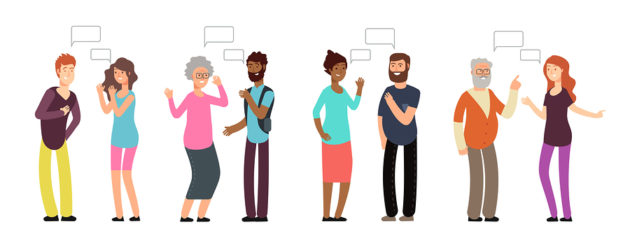How has human behavior been affected through the pandemic?
Photo by BigStock Image
The Pandemic has had a big effect on human behavior in the simplest of ways, including a basic face-to-face conversation.
An excited buzz filled the air on March 6, 2020. It was the last day before Lincoln Public Schools’ spring break. What no one knew, though, was it was also the last day of school for the year.
Five months later, East High students did something that they hadn’t done in a long time- they rolled out of bed, brushed their teeth and went to school. Masked, only on certain days of the week, but in person. Social distancing and hand-sanitizing were new developments, and teachers were busy cleaning classrooms. Even with all this, school was school. Except for those who felt it wasn’t.
“During the pandemic, about 4 in 10 adults in the U.S. have reported symptoms of anxiety or depressive disorder.” According to a Kaiser Family Foundation study. That’s roughly three times the normal rate.
Physical isolation and family financial stresses added to the physical concerns surrounding the pandemic. And East students felt and saw it reflected in their own and others’ dispositions.
“While quarantining, a lot of people are isolated from the rest of the world and rely on social media as their only means of connection,” said Akash Nooka, a senior. “In a way, an online community formed where people can share their thoughts and feelings, allowing for mental health support. Now, as things are dying down, I still notice people are comfortable sharing their thoughts online.”
Social media outlets like Instagram and Twitter, which were already a big part of teen life, became even bigger, and made up for the real-life social interactions. As Nooka noted, people have become much more vocal sharing their views online. The pandemic did have an odd side effect observed by Divya Sood, a student at Boston University and columnist for their student newspaper, The Daily Free Press.
In a column published in April, she said, “Coming to campus last Fall, I recall becoming socially drained quickly. Sometimes, I could not help but feel grateful that the public health restrictions made the freshman fall social scene a tad less overwhelming.”
A small upside, though, failed to overshadow something far darker. The Centers for Disease Control reported a 22.3% jump in summer emergency room trips for potential suicides by teens 12 to 17 compared to the year before. The trend worsened in the winter to 39.1% over the winter of 2019.
“The long-term effects of quarantines, social distancing, masks and isolation remain to be seen, but they may already be materializing,” said Dave Bundy, editor of the Lincoln Journal Star.
“The physical and emotional distance the pandemic created seemed to lower people’s inhibition,” Bundy said. “Basically, it made everyone bigger jerks.We see it in letters to the editor, in social media comments and in other interactions. It’s created another social ill – incivility – and there isn’t a vaccine for that.”

Hi! My name is Jacob Bundy. I am a senior here at Lincoln East and this is my first year on the Oracle staff. I love to watch sports, go on walks, listen...



